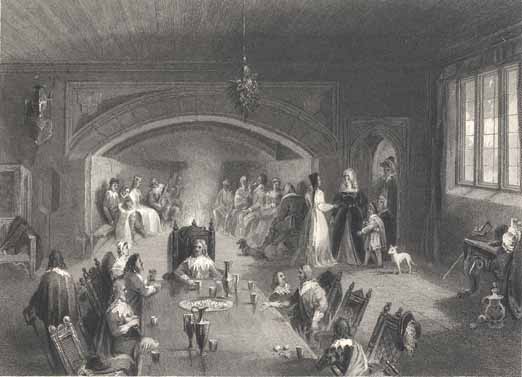
(19th Century Collection, 19th C. Coll. 820.5 FIS)
This engraving is one of a series featured in Fisher’s drawing room scrap-book (1835). Captioned Christmas in the Olden Time, the Victorian image portrays a whimsical and romantic view of festive celebrations as they might have taken place at Wycoller Hall, Lancashire, in 1650.
Keeping scrap books was a popular past-time for the middle classes in the nineteenth century. Many types of medium were considered worthy of being kept in scrap books, including newspaper clippings, engraved pictures and “scraps” themselves, which were printed pieces of paper carrying ornate designs in relief, often depicting childhood scenes, flora or fauna.
The mid-nineteenth century saw the publication of ornate leather-bound albums containing pre-printed pages on a variety of themes; some included pockets in which to put photographs or blank pages on which to sketch or paint, as in the case of Fisher’s scrap-book, which contains engravings and poetry interspersed with blank pages.
The poetry in Fisher’s scrap-book was composed by Letitia Elizabeth Landon (often known as “L.E.L.”) who composed her pieces to complement the engraved images which were submitted for inclusion in the publication.
As for Wycoller Hall, the building still stands, but in a ruinous state. Home to the Cunliffe family, it was built in the late sixteenth century but gradually fell into disrepair after being passed to the creditors of Henry Owen Cunliffe in 1818 after his death. The hall is widely believed to have been the inspiration for Ferndean Manor in Charlotte Brontë’s Jane Eyre, as the Brontë family lived in the nearby village of Haworth and eye-witness accounts gathered in 1901 from elderly residents of the surrounding Wycoller Village recollected the Brontë sisters visiting the area.
Landon composed a poem entitled Christmas in the Olden Time to accompany this engraving, and she prefaced her poem with the following quotation – allegedly from a Cunliffe family manuscript – describing a festive feast:
“At Wycoller Hall the family usually kept open house the twelve days at Christmas. Their entertainment was a large hall of curious ashlar work, a long table, plenty of furmenty like new milk, in a morning, made of husked wheat, boiled and roasted beef, with a fat goose, and a pudding, with plenty of good beer for dinner.”
